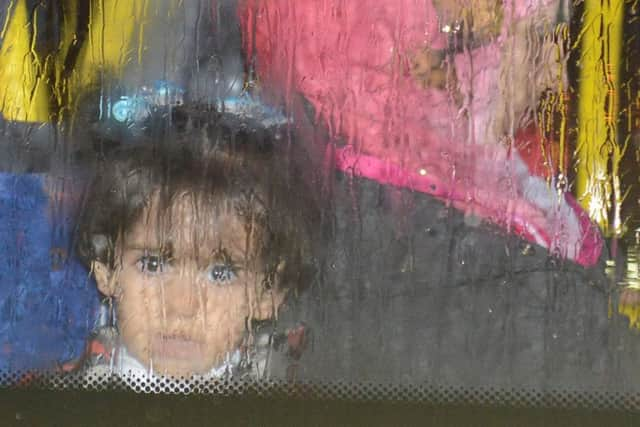Hannah McGill: No privacy when personal opinion is posted in public


The online distance from which so many of us now engage with others about sticky issues only compounds this instinct to either entrench one’s position, or walk away from the argument. The people who last week befouled social media with abuse against the first one hundred Syrian refugees arriving in Paisley and Renfrewshire probably aren’t going to refine their garbled take on things in response to being called names – although it is notable that at least one of them promptly claimed that it was her boyfriend who’d posted wild racist rants on her Facebook page. (Way to stand by your principles AND your man! That’s definitely the sort of honour and consistency that separates us from those desert savages that at least one of you dislikes so much.)
But wherever one locates the origins of this sort of malice – misdirected rage at real social injustice; an inevitable outcome of divisive media coverage; a revealing rip in the fabric of woolly liberal discourse – what’s interesting is the way in which today’s media can make what feels like personal discourse very, very public. The fact that the individuals who posted angry messages have been identified in the media – not only by their names, but by their places of work – has been decried by some as witch hunting and scare tactics. And yet the press didn’t expose them: they exposed themselves. In spite of an incredibly internet-dependent culture – new figures say that one in ten 12-to-15 year-olds believe unquestioningly in the truth of what they read online - it seems strangely difficult for people to grasp that things put up on social media accounts are public and permanent. You can’t place stuff in the public domain and then feel hunted or betrayed if it’s slyly traced back to you using underhand techniques like – er - reading the name on your profile. How strange that putting someone’s name in a newspaper is regarded as “naming and shaming” whereas shaming yourself publicly still seems to fall within most people’s conception of private communication.
Advertisement
Hide AdAdvertisement
Hide AdLocal MP Mhairi Black, herself no stranger to the reappearance of embarrassing old social media material, responded with a plea for greater tolerance and awareness of context, and that’s the right emphasis. And it should run both ways: it’s important for those of a liberal, compassionate bent to engage seriously with expressions of anger and prejudice, rather than just dismissing them or fighting fire with fire. But wherever our politics or our response to current events, one thing holds true for all of us: the stuff we output into the social media in angry, altered or unguarded moments is in our name, and it doesn’t take a hacker in a Guy Fawkes mask to trace it back to us.


Stone gone
Last week in Botswana, the world’s second-biggest diamond was discovered. Around the same time, in Edinburgh, I misplaced my engagement ring. I wasn’t hinting that it was time for an upgrade - honestly. I took it off, put it down, thought “I mustn’t leave that lying around,” got distracted and IT VANISHED. Naturally I told myself, and was kindly assured, that it didn’t matter, it was just an object – but how we do invest emotionally in certain objects, even those that aren’t flawless, fist-sized and worth multiple millions. Although our association of diamonds with romantic commitment is the product of a stroke of marketing genius, rather than anything deeply embedded in human culture. When a glut of diamonds flooded the market in the late 19th century, the clever people at De Beers hit on way to make everybody want one, by creating a campaign that linked ownership of one to being loved. Within a few decades, engagement rings with diamonds were de rigueur. Who can say how many of them have ever gone missing and been found twenty-four hours later carefully zipped into an old make-up bag and hidden underneath the sink, for no explicable reason other than encroaching senility or the intervention of a houseproud poltergeist? It’s a mystery. But at least it’s back. Hopefully slightly better security attends the Botswana rock.
Back to the future
Cold Feet is coming back, presumably now to be called Old Feet, or Foot Spa. Trainspotting is also coming back (Tramspotting?); star Robert Carlyle has made an appropriately foul-mouthed assertion that the sequel has “one of the best scripts I’ve f***ing read”. I rather enjoy the idea that the parallel worlds of these fictions have been carrying on offscreen all this time. I’d also like to know if Chandler and Monica are still together, and if grown-up Buffy is managing to balance career, family and slaying. More unsettling is the fact that I seem to have caught up with people who represented adulthood, albeit of a reluctant kind, when I was still a teenager: now, we’re all just middle-aged…